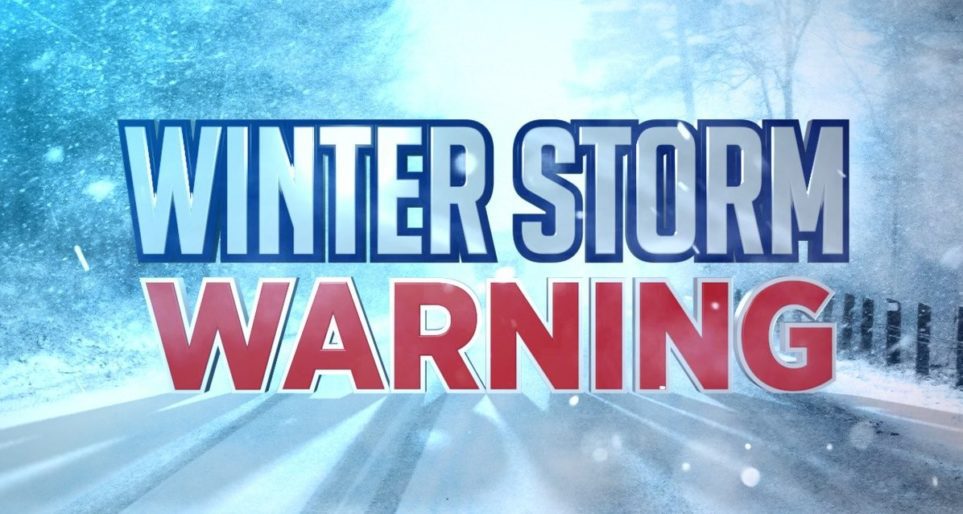Winter Storm Warning in effect from 5pm on Tuesday through 12pm on Thursday
Santa Fe, NM – The New Mexico Department of Homeland Security and Emergency Management (DHSEM) is encouraging residents to prepare for severe weather beginning this evening, Tuesday February 1st. In a Special Weather Statement, the National Weather Service’s (NWS) Albuquerque office said the combination of an upper-level storm system and an arctic airmass could “produce the most widespread and severe winter weather conditions northern and central New Mexico has experienced this season.” NWS Albuquerque has also issued a Winter Storm Warning for portions of northern and central New Mexico from 5pm on Tuesday the 1st through 12pm on Thursday the 3rd.
“New Mexicans, especially those in northern parts of the state, should be prepared for heavy snowfall, cold temperatures, and potentially dangerous driving conditions,” said DHSEM Deputy Secretary Kelly Hamilton. “Our department, including the State Emergency Operations Center, is ready to support our local communities. And remember, you can monitor road conditions by dialing the New Mexico Road Advisory Hotline at 5-1-1.”
According to the same Special Weather Statement:
“Light to moderate snow will begin across northwest and north central New Mexico Tuesday night then expand southward Wednesday and Wednesday night. While forecast models still differ in the track and timing of the storm system, greatest snow accumulations currently favor the northern and Sandia and Manzano mountains, adjacent highlands and locales along the Continental Divide.
Combined with the snow, unseasonably cold temperatures will impact the region. Highs over eastern New Mexico Wednesday and Thursday will range from the teens to the mid 30s, with Thursday expected to be the coldest day. Some of this frigid air may bleed westward into the Rio Grande Valley and to the Continental Divide on a gusty east wind by Thursday, when highs in the Albuquerque Metro will struggle to reach the upper 20s. Dangerously cold wind chills will also exist Thursday and Friday mornings from the central mountain chain over the eastern plains.”
Residents who experience power outages or other urgent challenges due to extreme weather should reach out to their city, county, or tribal emergency managers. The American Red Cross may also be able to provide assistance and can be reached at 800-842-7349.
Below are some cold weather safety tips from NWS and DHSEM:
- When you are outside, frostbite and hypothermia are possible.
· Wear layers of loose-fitting, lightweight, warm clothing.
· Wear a hat. Try to stay dry and out of the wind.
· Cover your mouth to protect your lungs from extreme cold.
- To keep pipes from freezing:
· Let hot and cold water trickle or drip at night from a faucet.
· If you plan to be away:
i. Have someone check your house daily to make sure the heat is still on to prevent freezing, or
ii. Drain and shut off the water system (except indoor sprinkler systems).
- If pipes freeze:
· NEVER try to thaw a pipe with an open flame or torch. Use a hair dryer instead.
· Always be careful of the potential for electric shock in and around standing water.
- Carbon monoxide poisoning is a silent, deadly killer claiming about 1,000 lives each year in the United States.
· Install a carbon monoxide detector.
· NEVER run generators indoors.
· Open a window slightly when using a kerosene heater and follow the manufacturer’s instructions.
· NEVER use a gas oven to heat your home.
- Wood-burning stoves, fireplaces and heaters:
· Always keep a screen around an open flame.
· NEVER use gasoline to start your fireplace.
· NEVER burn charcoal indoors.
- Animal and pet safety:
· Bring pets inside.
· Keep salt away from paws
· Check your battery, fluids, and tires
· Have jumper cables
· Pack a blanket, a flashlight, and emergency food and water
· Make sure your phone is charged before leaving
· Residents can monitor road conditions by dialing the New Mexico Road Advisory Hotline at 5-1-1 or by visiting nmroads.com.
For more safety recommendations, please see:


